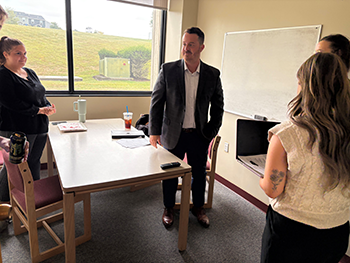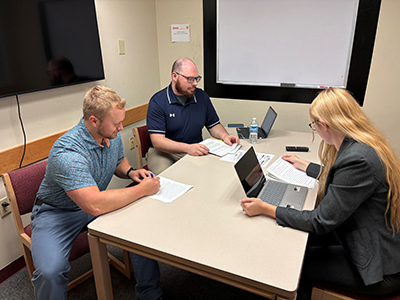
Widener Law Commonwealth students gain real-world practice through mediation simulation
It wasn’t a lecture. It wasn’t a textbook exercise. At Widener University Commonwealth Law School, students found themselves negotiating a workplace dispute that could have come straight out of the headlines.
Inside Professor Christian Johnson’s alternative dispute resolution class, third-year law students took on the roles of plaintiff, defense counsel, corporate representatives, and mediators in a two-hour simulation. The case: a former employee alleging sexual harassment and retaliation under Title VII. The task: reach a settlement without going to trial.
“Only about 2 percent of lawsuits actually go to a verdict in court,” Johnson said. “The rest settle in different ways. Placing students in a real-life simulation of a mediation is a terrific way for them to understand how it works and what it entails.”
Attorney Brooks Foland '93, who regularly serves as a mediator and guest in Johnson’s class, said the exercise provides an essential bridge between theory and practice. “While simulations or mock mediations are somewhat constrained by the limited amount of time allowed for the exercise and the limited amount of materials available for review, they’re useful for putting theoretical concepts to work in a near-real-life scenario,” he said. “Of course, real mediations have raw energy and emotion that can’t easily be replicated in any simulation.”
 Third-year student Sydney Kline drew the role of the corporation. For her, the toughest part was separating personal feelings from her assignment.
Third-year student Sydney Kline drew the role of the corporation. For her, the toughest part was separating personal feelings from her assignment.
“On a personal level, I did not want to low-ball the plaintiff because sexual harassment and retaliation can be extremely detrimental to one’s emotional state,” Kline said. “But in the role of the defendant corporation, I needed to keep the settlement value as low as possible.”
Across the table, classmate Sarah Phillips represented the plaintiff. She pushed for remedies that felt personal and meaningful to her client.
“Actually engaging in a mediation practice instead of just learning about it from a book made me understand the purpose and practice more than lectures ever could,” Phillips said. “Eventually we were able to get the defendant to agree to pay for my client’s tuition, change their sexual harassment policies, and fire those who engaged in the negative actions.”
For many students, the biggest surprise was how different mediation felt from courtroom training.
“My legal education has emphasized litigation, so I kept wanting to argue,” said Drake Maitem, who acted as defense counsel. “But I realized mediation isn’t necessarily the place for an attorney to demonstrate argumentative skills. I found myself participating more as a shield than as a sword.”
Kline said the process pulled back the curtain on what had once felt mysterious. “As a law student, the negotiation process seems like some elusive secret that nobody understands,” she said. “But actually going into the room and doing a mock negotiation helped me understand what really happens.”
Foland said that kind of insight is exactly what future attorneys need. “Critical and empathetic listening is crucial in mediation, regardless of the side of the case you’re working,” he said. “Only then can an attorney learn their client’s, as well as the opposing party’s, real interests and needs.”
All three students walked away with the same lesson: mediation isn’t second-rate lawyering, it’s a critical part of practice.
“The simulation helped me understand that mediation, though not considered part of the formal litigation process, can still make clients feel like they’re getting their day in court,” Kline said. “Formal litigation takes a lot of time and money. If everyone is willing, mediation can help everyone get to the end goal of resolution without having to expend unnecessary resources.”
Johnson said that’s exactly the point. “Because many cases do settle, understanding how mediation and other alternative dispute resolution practices work is vitally important to their success as future lawyers,” he said.
 Foland agreed and encouraged students to explore the field further. “Take as many ADR classes in law school as are offered,” he said. “Ask ADR professionals to let you sit in on mediations or arbitrations. Whether you work in the private sector or for the government, ADR will continue to grow in all aspects of the law. Even if you don’t become a mediator yourself, learning these concepts will make you a better advocate for your clients.”
Foland agreed and encouraged students to explore the field further. “Take as many ADR classes in law school as are offered,” he said. “Ask ADR professionals to let you sit in on mediations or arbitrations. Whether you work in the private sector or for the government, ADR will continue to grow in all aspects of the law. Even if you don’t become a mediator yourself, learning these concepts will make you a better advocate for your clients.”
For students preparing to enter the profession, the experience was about more than drafting agreements. It was about patience, compromise, and learning how to protect a client while moving toward resolution.
Or as Kline put it: “Negotiation and mediation are very hands-on. They take time, they can’t be rushed, and above all, you have to respect your client’s wishes when negotiating on their behalf.”
